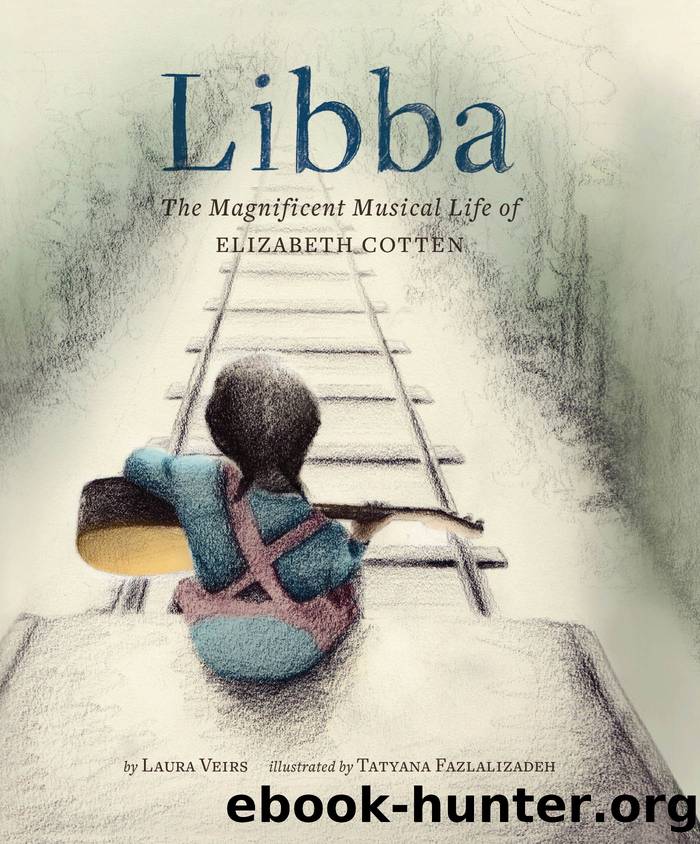Libba by Laura Veirs

Author:Laura Veirs [Veirs, Laura and Tatyana, Fazlalizadeh]
Language: eng
Format: epub
Publisher: Chronicle Books LLC
Published: 2018-10-15T00:00:00+00:00
I first learned about Libba when I was a young childâmy father used to play âFreight Trainâ on our family guitar. My parents both sang the song to me before bedtime. I grew to love it, and it played as a kind of soundtrack in our home.
By the time I was twenty-five, I had an album under my belt and was on my way to becoming a touring musician and professional songwriter. I began studying country-blues guitar. I was reintroduced to âFreight Trainâ and was surprised by the complexities of the fingerstyle technique behind this seemingly simple folk song of my youth. I was blown away when I learned that Libba Cotten was self-taught and played upside down and backwards. This means that she turned the guitar upside down and played it left-handedâthe bass strings for her were at the bottom, towards the floor, which is technically âbackwards.â It was especially inspiring to watch her play in videos: As a guitar player, it was hard to imagine how anyone could play the way she did. Though it was difficult at first, I learned her song note for note. With time it became easy, and I still love to play âFreight Trainâ and many of her other songs.
When I had my first child, I recorded my first album of songs for children. While researching songs for the album, I discovered an amazing album by beloved folk musician Peggy Seeger called American Folk Songs for Children. I learned that Peggyâs mother, Ruth Crawford Seeger, was a prominent folk-song collector, composer, and piano teacher in the 1950s. Her life intrigued me, and in researching Ruth Seeger, I learned that through a chance encounter in a department store, Libba Cotten became her housekeeper. This accidental meeting of two musical geniuses was a wonderful discoveryâand a story worth telling.
Through my interviews with Libbaâs friends and family, I got to know more about what she was like. I learned about what she wore (a long dark dress and an apron at work, and later, shawls and long gathered skirts on stage) and what she liked to cook (cakes and chicken and dumplings). Everyone spoke about her kind smile, wry sense of humor, and feisty energy. It made sense to me that she toured into her nineties.
Libba believed that people could accomplish anything at any age. Her story appeals to me as a musician, as a woman, and as a fan of folk history. Libba accomplished so much despite growing up poor in the segregated South where very few opportunities were available to her. I hope readers will explore the life and music of Libba Cotten, a beautiful tributary of the great river that is American folk music.
Download
This site does not store any files on its server. We only index and link to content provided by other sites. Please contact the content providers to delete copyright contents if any and email us, we'll remove relevant links or contents immediately.
Pale Blue Dot by Carl Sagan(4996)
I'm Still Scared by Tomie dePaola(4378)
Bloody Times by James L. Swanson(4365)
Pocahontas by Joseph Bruchac(4248)
Seriously... I'm Kidding by Ellen DeGeneres(3629)
Little Author in the Big Woods by Yona Zeldis McDonough(3514)
The Science Book (Big Ideas Simply Explained) by DK(3277)
Hello, America by Livia Bitton-Jackson(3161)
The President Has Been Shot!": The Assassination of John F. Kennedy by Swanson James L(3094)
Earthrise by Edgar Mitchell(3036)
The Extraordinary Suzy Wright by Teri Kanefield(2713)
Ben Franklin's Almanac by Candace Fleming(2525)
Brown Girl Dreaming by Jacqueline Woodson(2308)
Cleopatra: A Life by Stacy Schiff(2269)
Birds, Beasts and Relatives by Gerald Durrell(2218)
The Audition by Maddie Ziegler(2196)
I Will Always Write Back by Martin Ganda(2157)
Bloody Times: The Funeral of Abraham Lincoln and the Manhunt for Jefferson Davis by James L. Swanson(2118)
The Complete Adventures of Curious George by H. A. Rey(2043)
